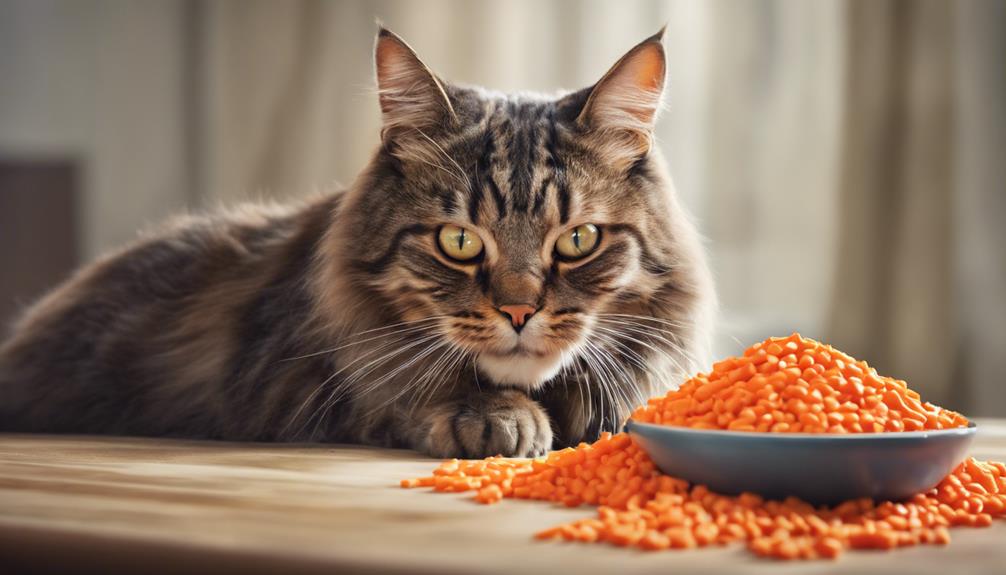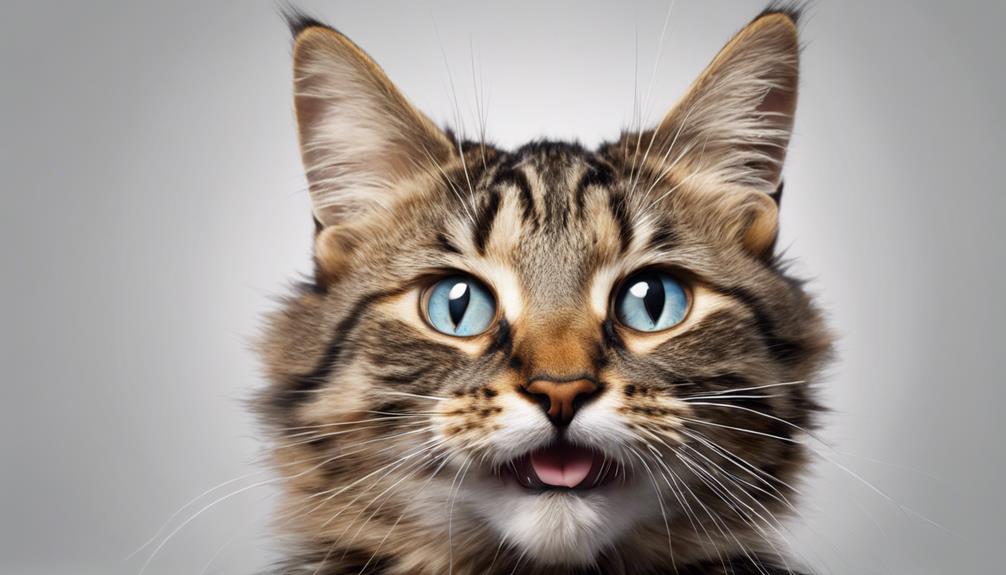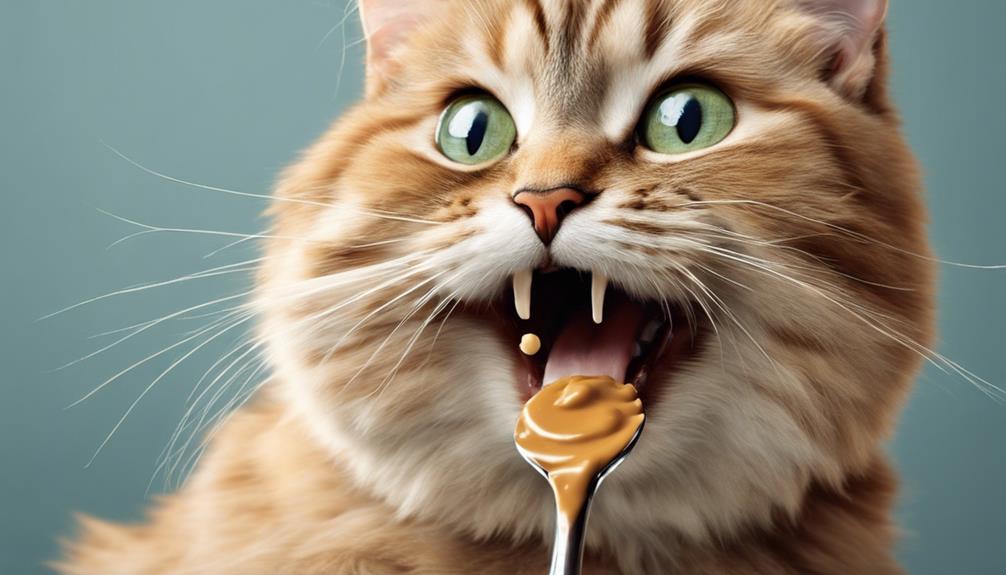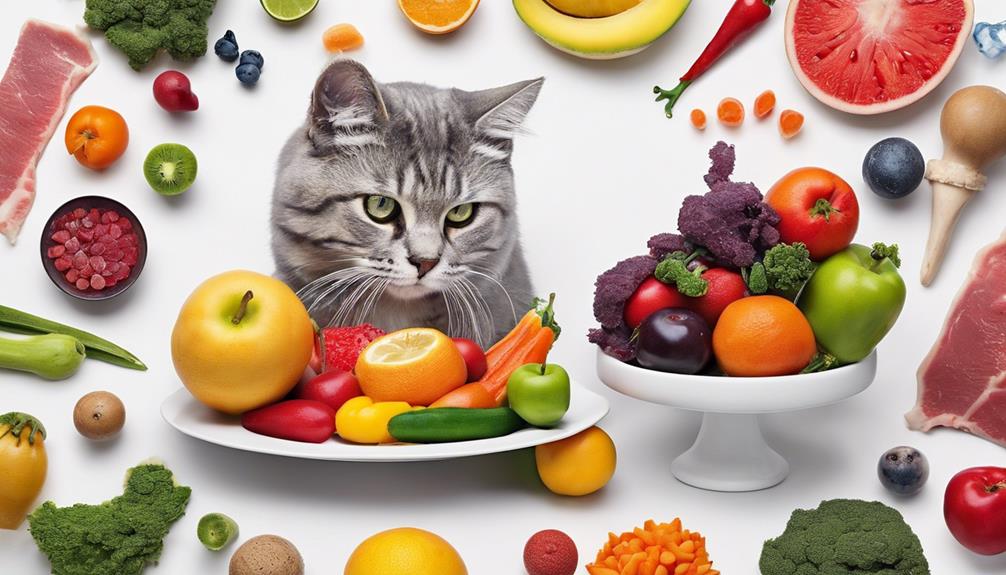Cats can enjoy carrots in moderation for added nutrients in their diet. Carrots offer fiber, vitamins, and minerals that benefit cats. Remember, cats do not taste sweetness, so limit carrots to prevent health issues. Too many carrots can cause problems, so offer in small amounts. Cooked carrot pieces should be small to avoid choking hazards. Consult a vet if cats show diabetes symptoms. While carrots can be a healthy snack, keep moderation in mind. Cats need a balanced diet with primarily animal proteins. Carrots can be a good addition, but understanding limits is key for cat health.
Key Takeaways
- Cats can have carrots in moderation for essential nutrients.
- Carrots offer fiber, vitamins, and minerals beneficial to cats.
- Excessive carrot consumption can lead to health issues.
- Limiting carrots helps maintain a balanced cat diet.
- Consult a vet if unusual symptoms arise from carrot consumption.
Cats and Carrots: Compatibility in Diet
When thinking about cats and carrots in their diet, it's important to grasp the compatibility between the two for peak feline health. Cats can indeed have carrots in moderation as part of their diet.
While cats may not be drawn to the sweetness of carrots due to their lack of sweet taste receptors, these veggies offer essential nutrients like fiber, vitamins, and minerals that can support digestion for our feline friends.
However, it's crucial to be mindful of the amount of carrots we incorporate into their diet. Excessive consumption can introduce health issues for cats because of the natural sugar content in carrots. To prevent gastrointestinal problems and maintain a balanced diet for our beloved cats, it's best to limit their carrot intake.
Benefits of Carrots for Cats
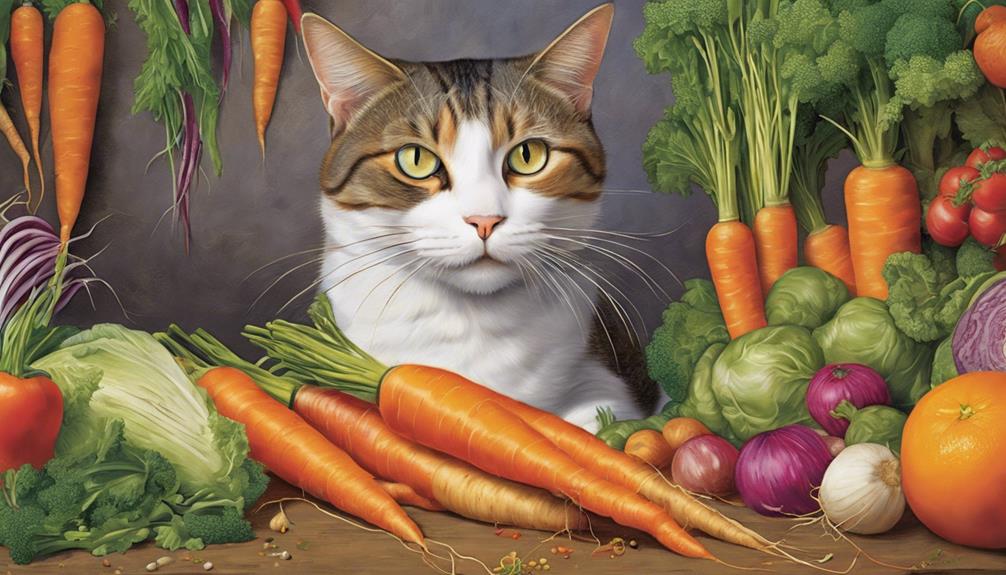
Carrots provide valuable nutrients that support feline health, including fiber, vitamins, and antioxidants essential for cats' well-being. These vibrant veggies contain vitamins and minerals like K1, B6, and potassium, which are beneficial for our furry friends. The beta carotene found in carrots is converted into vitamin A, acting as an important antioxidant for maintaining a cat's health. Additionally, feeding cats small amounts of carrots can aid in preventing cognitive decline, protecting against lung cancer, and promoting skin and eye health.
In addition to these benefits, carrots are low in calories, making them a healthy snack option for cats. They also boost the immune system and aid in digestion, contributing to overall well-being. By offering carrots in moderation as part of a balanced diet, we can ensure our feline companions receive these nutritional advantages. Remember, incorporating a variety of nutrient-rich foods is key to supporting our cats' health and vitality.
Risks of Carrots in Cat Diets
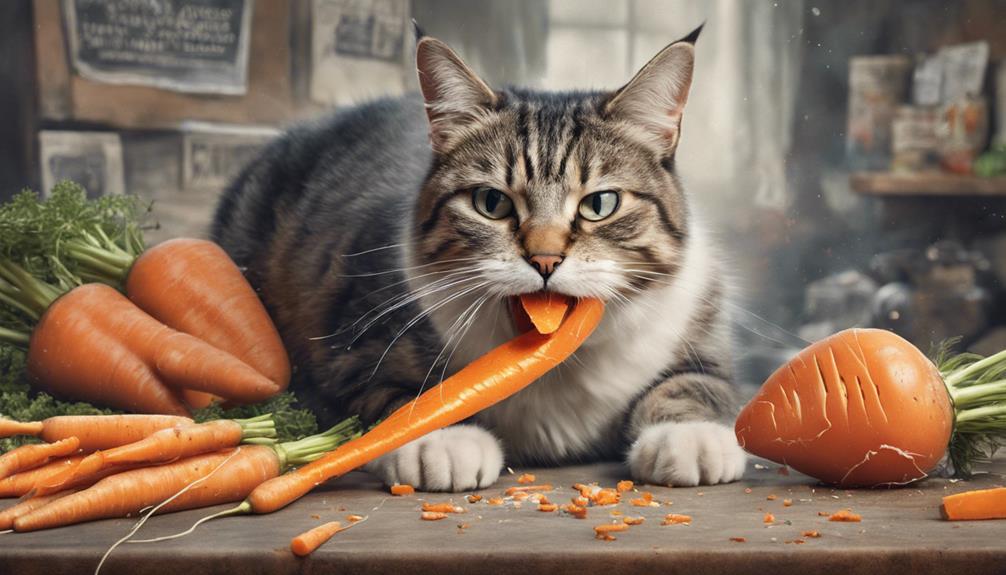
Moving from discussing the benefits of carrots for cats, we must now address the potential risks associated with incorporating this vegetable into their diet. While cats may enjoy the texture of carrots, excessive consumption can lead to obesity and diabetes symptoms. Regular intake of carrots may also cause digestive issues in cats. Symptoms of feline diabetes include excessive thirst, constant urination, and lack of appetite. If these symptoms appear in your cat due to carrot consumption, it is important to consult a vet promptly for proper evaluation and guidance.
| Risks of Carrots in Cat Diets | ||
|---|---|---|
| Obesity and Diabetes | Symptoms of Feline Diabetes | Digestive Issues |
| Excess consumption can lead to weight gain and diabetes in cats. | Look out for excessive thirst, frequent urination, and decreased appetite. | Regular intake may result in digestive problems for cats. |
Serving Carrots to Cats Safely
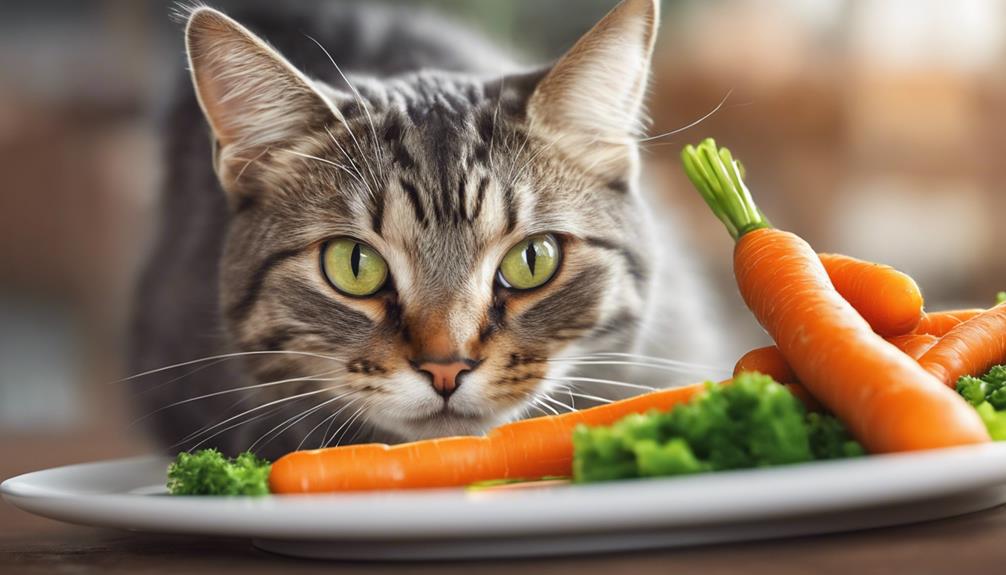
To guarantee the safety of cats when serving carrots, it's important to provide cooked pieces in small sizes to prevent choking and aid digestion. Cats eat carrots best when they're cut into tiny, manageable bits. This ensures they can enjoy the crunchy texture without any risk.
Feeding cats large chunks of carrots can pose a choking hazard, so it's essential to show them love by preparing the carrots in a way that considers their well-being. By offering carrots in small pieces, you not only help prevent any potential issues but also make it easier for your feline friend to munch on this healthy treat.
Carrots: A Cats Occasional Treat
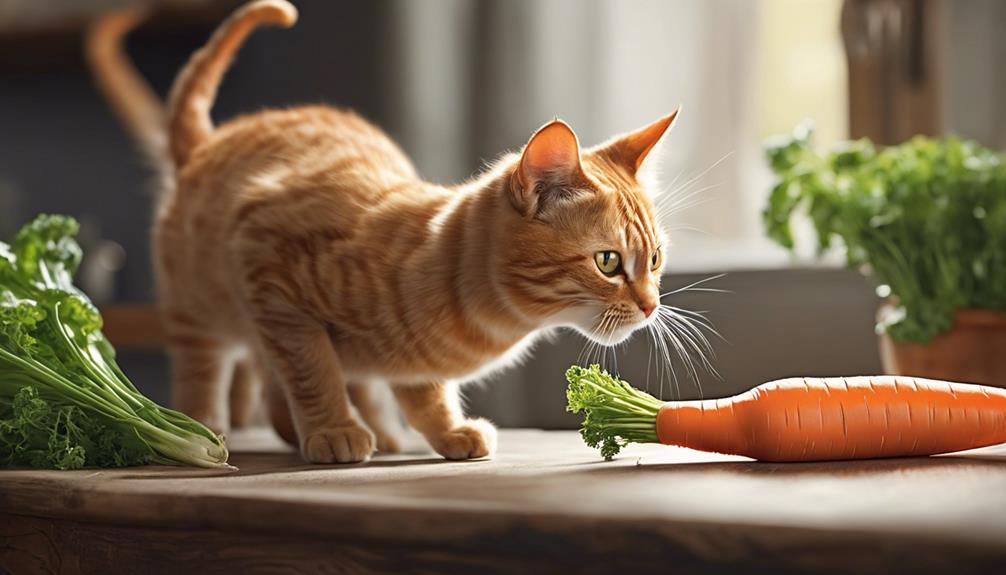
Carrots can be a delightful treat for our feline friends, offering them a crunchy snack with nutritional benefits. Moderation is key when feeding cats carrots, as they're carnivores by nature and should primarily consume meat.
Cats Occasional Treat
When considering treats for cats, an occasional addition like carrots can provide valuable nutrients and a different texture for their enjoyment. While cats may not taste the sweetness in carrots, they can benefit from the fiber and essential vitamins present.
It's important to offer carrots in moderation to prevent any potential health issues due to excess sugar intake. Remember to cook the carrots before serving them to your cat to avoid choking hazards and aid in digestion.
A balanced diet primarily consisting of meat is essential for cats, with occasional vegetable treats like carrots adding variety. By incorporating carrots as an occasional treat, you can provide your feline friend with a healthy and enjoyable snack option.
Nutritional Benefits for Cats
Incorporating carrots into a cat's diet as an occasional treat can provide essential vitamins and beneficial fiber content for their overall health and well-being. Cats can eat carrots to receive important nutrients like Vitamin A, K1, and B6, supporting their immune system and overall health. The fiber in carrots aids in digestion and can help prevent pesky hairballs in our feline companions.
When considering their feline diet, health benefits of carrots include being a key, low-calorie treat option, perfect for overweight cats seeking a satisfying crunch without excess calories. It's important to offer carrots in moderation to avoid potential health issues like obesity and diabetes symptoms.
Carrots: Not a Cats Dietary Staple
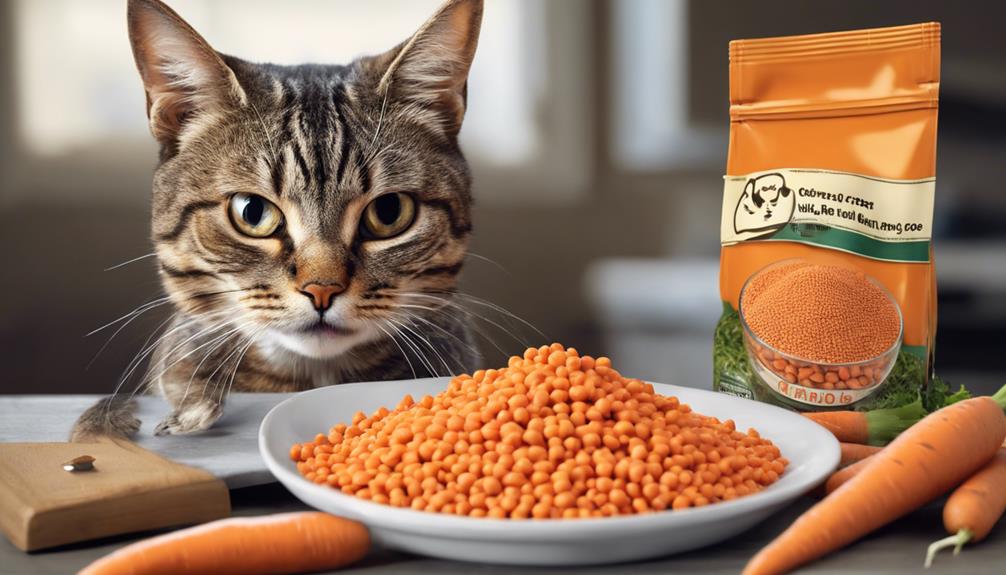
Carrots may not be a usual part of a cat's diet since they're obligate carnivores. Due to cats lacking sweet taste receptors, they mightn't be inclined to enjoy the sweetness of carrots.
While cats can consume carrots occasionally, it's important to make sure they receive all necessary nutrients from animal sources for best health.
Nutritional Value of Carrots
Although not a staple in a cat's diet, carrots can offer some nutritional benefits. When considering the nutritional value of carrots for cats, it's important to remember moderation is key. Here are some essential points to keep in mind:
- Carrots contain essential fiber that aids in digestion for cats.
- The vitamins found in carrots, such as vitamin A, can contribute to overall feline health.
- Minerals like potassium in carrots can support proper bodily functions in cats.
- The small size and crunchiness of carrots make them a fun and interactive treat for your feline friend.
Cats Digestion of Carrots
While cats can consume carrots, it's important to recognize that they aren't a fundamental component of a cat's diet due to their lack of enzymes for digesting plant matter efficiently.
Cats, as obligate carnivores, primarily require animal-based proteins for essential nutrients. Their digestive systems are designed to break down and absorb nutrients from meat, not vegetables like carrots. Carrots don't provide taurine, an essential amino acid critical for cats' health.
Although cats can eat carrots, they shouldn't make up a significant portion of their diet. It's important to prioritize feeding cats a balanced diet that aligns with their natural dietary needs to guarantee they receive all the necessary nutrients for optimal health.
Moderation Is Key
Cats' dietary requirements primarily revolve around animal-based proteins, emphasizing the importance of moderation when considering incorporating carrots into their diet. Here are four essential points to keep in mind:
- Cat food should be the main source of nutrition for your feline friend, focusing on high-quality animal proteins.
- Cats are obligate carnivores, meaning their bodies are designed to thrive on meat-based diets.
- Moderation is key when it comes to offering carrots as treats, as they aren't a necessary component of a cat's diet.
- Excessive carrot consumption can lead to health issues due to their natural sugar content.
Cat Nutrition: Carrots Insights
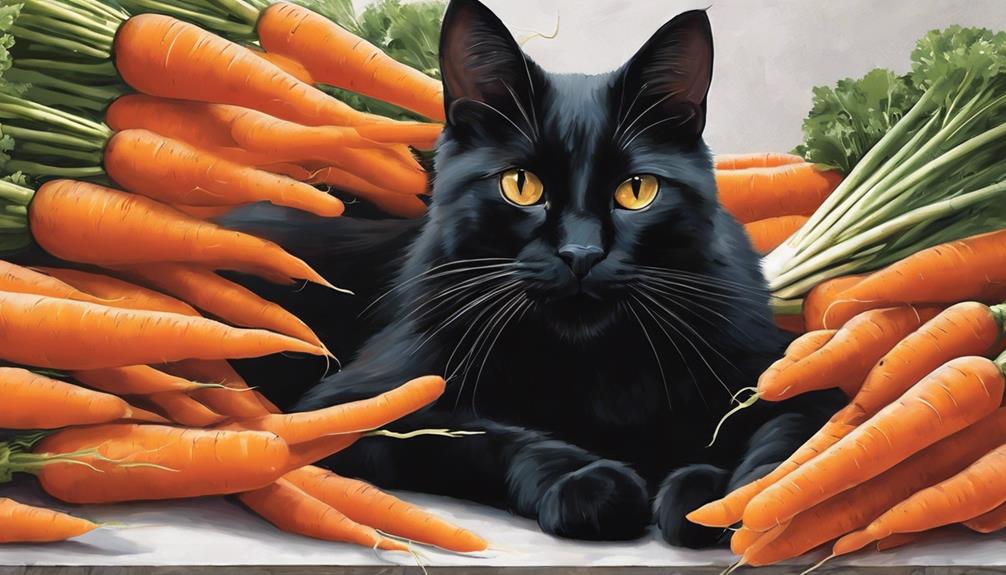
Incorporating carrots into a cat's diet can provide valuable nutritional benefits to support their overall health and well-being. Carrots offer essential vitamins, fiber, and minerals that contribute to a well-rounded feline diet. While cats may not be enticed by the sweetness of carrots due to their lack of sweet taste receptors, the crunchy texture can still be appealing to them. It's important to remember that moderation is key when introducing new foods to your cat, including vegetables like carrots.
Here's a handy table summarizing the key insights about feeding carrots to your feline friend:
| Benefit | Nutrient | Caution |
|---|---|---|
| Provides vitamins | A, K, C | Watch for excessive sugar intake from carrots. |
| Offers fiber | Make sure carrots are plain without added ingredients. | |
| Supports overall health | Monitor your cat's reaction to carrots for any sensitivities. |
Carrots: Cats and Digestion
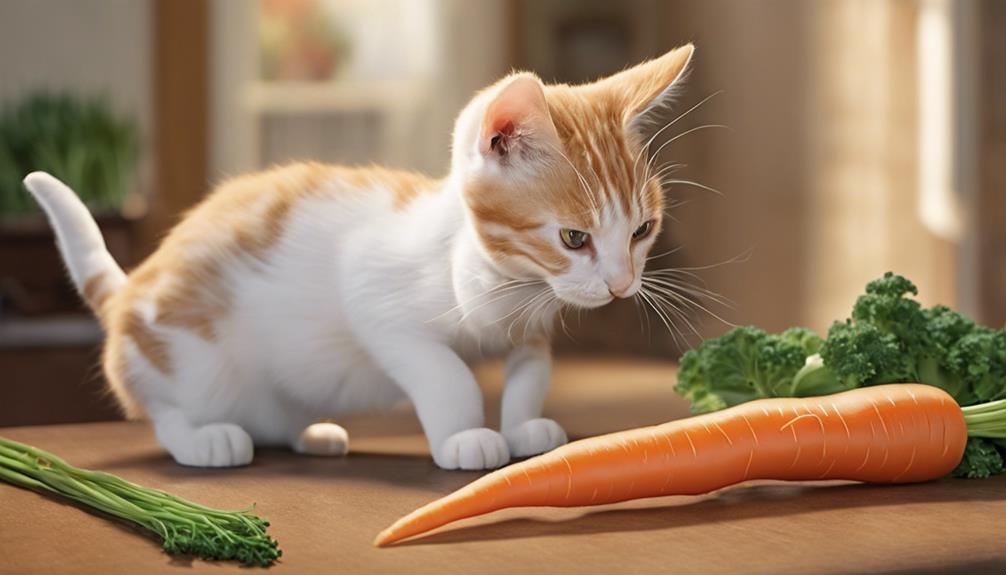
With their fiber-rich content, carrots can play a beneficial role in enhancing a cat's digestion.
- The fiber in carrots acts as a gentle broom, sweeping through a cat's digestive system and promoting regular bowel movements.
- Digestive enzymes present in carrots assist in breaking down food, aiding in the absorption of nutrients and supporting healthy digestion.
- Cats prone to constipation can benefit from the regular inclusion of carrots in their diet, thanks to the fiber content that helps maintain bowel regularity.
- By incorporating carrots in moderation, you can contribute to your cat's overall digestive health, keeping their system running smoothly and preventing potential issues like constipation.
Carrots: Cats and Essential Vitamins
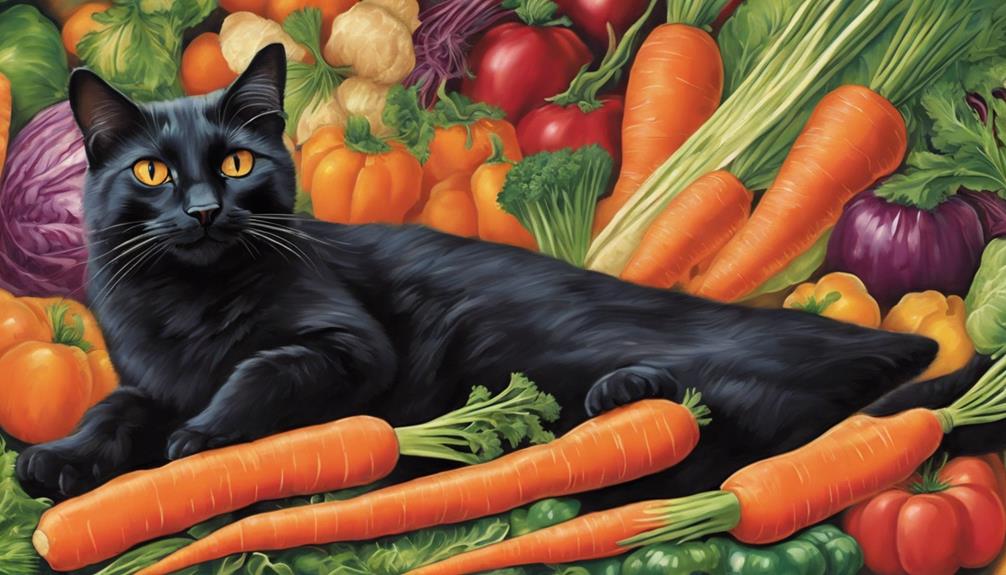
Carrots offer a plethora of essential vitamins for our feline friends, including vitamin A, B6, and beta carotene. These nutrients play a pivotal role in enhancing cats' immune system, cognitive functions, and overall well-being.
Vitamin A for Cats
Rich in beta carotene, an essential precursor to Vitamin A, carrots play a significant role in maintaining cats' eye health and vision. Here are four key points to help you understand the importance of Vitamin A for your feline friend:
- Night Vision: Vitamin A derived from beta carotene in carrots is vital for cats to see well in low light conditions.
- Healthy Skin: Adequate Vitamin A intake supports cats in maintaining healthy skin and a shiny coat.
- Nutritional Supplement: While cats can't efficiently convert beta carotene into Vitamin A, carrots can still provide valuable nutritional benefits.
- Balanced Diet: While carrots are beneficial, cats primarily require animal-based proteins for optimal health, making them an essential part of a well-rounded diet.
Benefits of Carrots
Moving from discussing Vitamin A for cats, let's now focus on the benefits that carrots offer our feline companions, particularly in providing essential vitamins for their overall health and well-being. Carrots are a fantastic addition to your cat's diet as they are packed with essential vitamins like Vitamin K1, B6, and beta carotene, which play an important role in supporting your cat's immune system and overall health. Additionally, the low-calorie content of carrots makes them a great option for cats watching their weight. The high fiber content in carrots also aids in digestion and promotes gut health for your furry friend. Check out the table below to see a summary of the benefits of carrots for your cat:
| Benefits of Carrots for Cats |
|---|
| Rich in essential vitamins like Vitamin A, K1, and B6 |
| Low in calories but high in fiber |
| Supports digestion and gut health |
| Linked to preventing cognitive decline and supporting skin and eye health |
Moderation Is Key
Incorporating carrots into a cat's diet in moderation provides essential vitamins that contribute to their overall health and well-being. When considering how much of this veggie your cat consumes, ensuring moderation is crucial to guarantee they enjoy the benefits without overdoing it. Here are some important points to keep in mind:
- Offering small, grated amounts of carrots ensures easy digestion for your feline friend.
- Moderation prevents potential digestive issues that may arise from excessive carrot intake.
- Including carrots as an occasional treat keeps the nutrient intake balanced in your cat's diet.
- Monitoring your cat's response to carrots helps you tailor their diet to suit their individual needs.
Limiting Carrots in Cat Diet
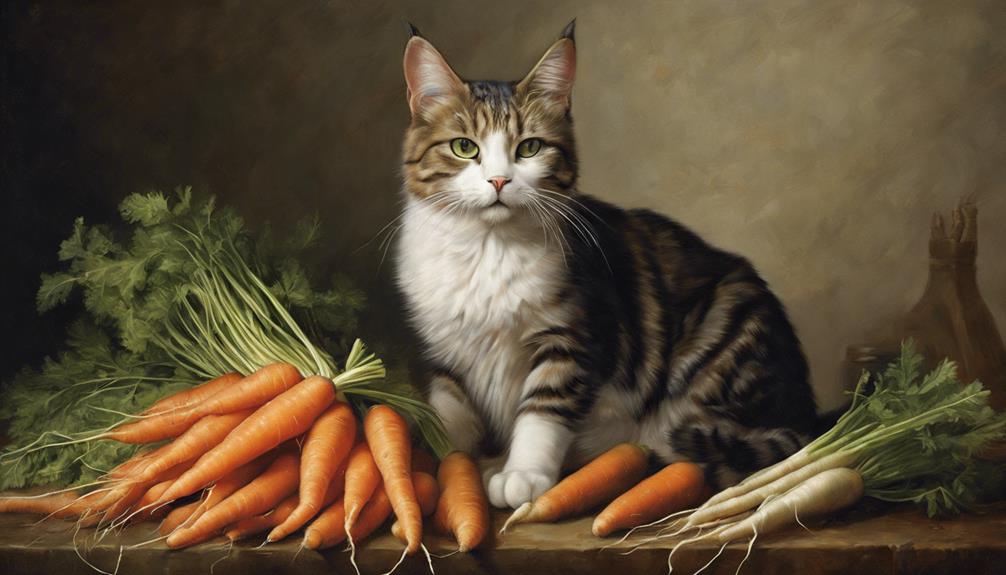
To maintain ideal feline health, it's important to limit the inclusion of carrots in a cat's diet to less than 10%. While cats are obligate carnivores, meaning they require a diet primarily based on animal proteins, the occasional carrot treat can offer variety. However, excessive carrot consumption can lead to gastrointestinal issues and long-term health problems for our beloved feline friends.
Since carrots lack taurine, a vital amino acid for cats found mainly in animal-based proteins, they shouldn't be a primary source of nutrition. Instead, emphasize a balanced diet rich in high-quality animal proteins to guarantee your cat's well-being. Treats like carrots can be given sparingly to prevent potential health risks associated with excess sugar intake.
Carrots: Cat Health Considerations
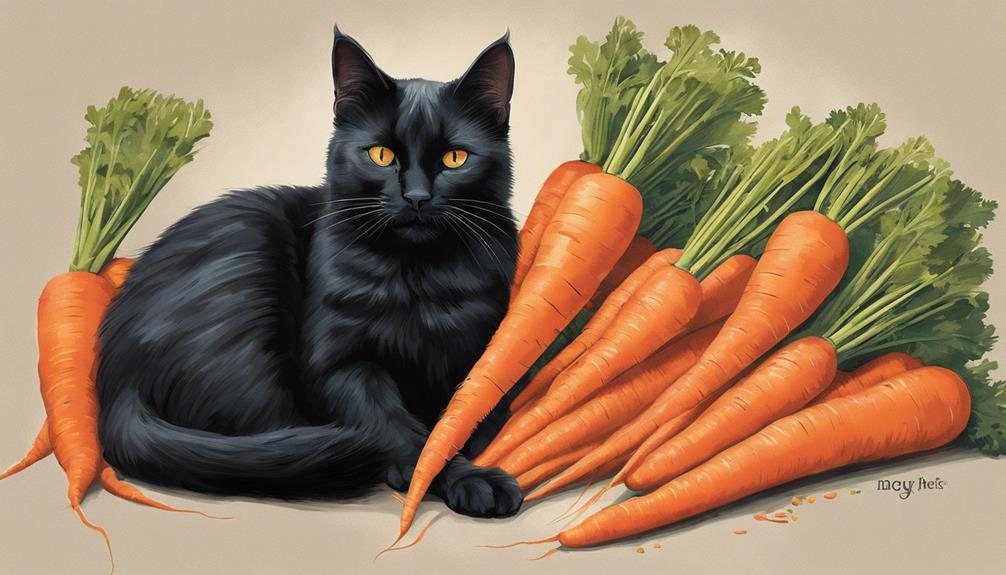
As we shift our focus to 'Carrots: Cat Health Considerations,' it's important to recognize the impact of carrot consumption on our feline companions' well-being. When considering carrots for your cat, keep in mind the following:
- Cat Health Considerations: Before adding carrots to your cat's diet, consult with a veterinarian to make sure it aligns with their specific health needs.
- Gastrointestinal Issues: Introduce carrots gradually to monitor how your cat's stomach reacts. Sudden changes can lead to digestive upset.
- Essential Vitamins: Carrots offer essential vitamins like Vitamin A and K, but these should be balanced with other nutrients in your cat's diet.
- Moderation is Key: While carrots can be a healthy addition, remember that moderation is essential. Excessive consumption can lead to health issues over time.
Understanding these considerations will help you make informed decisions about incorporating carrots into your cat's diet while prioritizing their health and well-being.
Carrots: Moderation Is Key for Cats
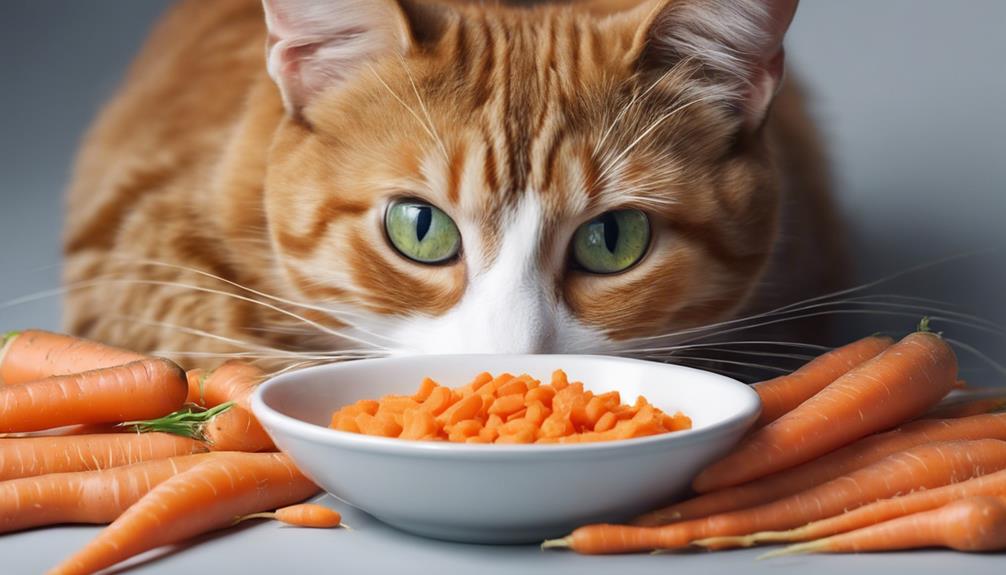
Moderating carrot intake is vital for maintaining the health of cats. While cats can consume carrots as part of their diet, it's important to practice moderation. Since carrots aren't a natural part of a cat's diet, too much consumption can lead to digestive issues and potential long-term health problems.
Cats may not be attracted to the sweetness of carrots due to their lack of sweet taste receptors, but these veggies can still provide fiber, vitamins, and minerals beneficial for their health. However, the natural sugar content in carrots should be considered when incorporating them into a cat's diet.
To guarantee the safety and health of cats, it's important to prepare carrots without adding ingredients like salt. By offering carrots in moderation and as a supplement to their regular diet, cat owners can provide a healthy treat that adds variety without causing any harm.
Carrots: Cats and Digestive Health
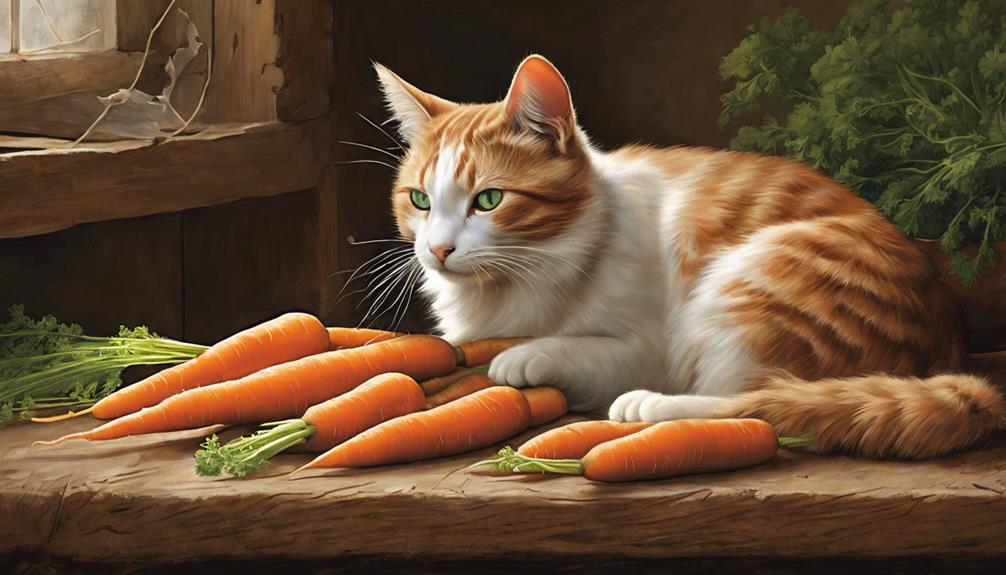
When considering the impact of carrots on cats, it becomes evident that their fiber-rich content plays a significant role in promoting digestive health.
- Fiber Content: Carrots are packed with fiber, which is essential for maintaining a healthy digestive system in cats.
- Regulate Bowel Movements: The fiber in carrots helps regulate bowel movements, preventing issues like constipation in our feline friends.
- Gastrointestinal Tract: By promoting gut health and aiding in digestion, carrots support a robust gastrointestinal tract in cats.
- Overall Well-Being: Including carrots in moderate amounts in a cat's diet can contribute to their overall digestive well-being, keeping their systems running smoothly.
Incorporating carrots into your cat's diet can be a simple yet effective way to enhance their digestive health. The fiber in carrots not only supports regular bowel movements but also helps maintain a healthy gastrointestinal tract. Remember, moderation is key when introducing new foods to your cat's diet to guarantee they reap the benefits without any adverse effects.
Carrots: Cats and Natural Sugars
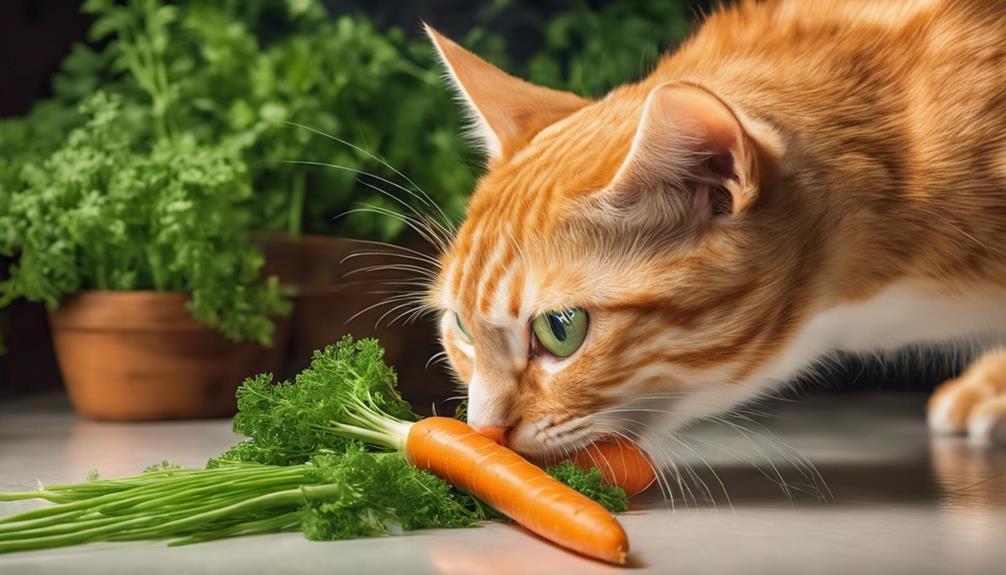
When discussing cats and natural sugars found in carrots, it's crucial to note that felines lack sweet taste receptors, so they mightn't be attracted to the sweetness of this vegetable.
However, cats may still appreciate carrots for their texture and other flavors present.
While carrots can provide advantages like fiber and nutrients to cats, moderation is crucial due to the natural sugar content present in this veggie.
Carrots and Feline Diets
In considering feline diets, the inclusion of carrots can provide cats with natural sugars for energy, albeit in moderation. Here are some key points to keep in mind about carrots and feline diets:
- Cats can't fully taste the sweetness in carrots due to their lack of sweet taste receptors.
- The natural sugars in carrots serve as an energy source for felines.
- Excessive carrot consumption can result in digestive issues for cats due to the high sugar content.
- It's best to offer carrots as an occasional treat rather than a significant portion of a cat's diet.
Benefits of Carrots
Let's explore how carrots can provide cats with a nutritious low-calorie treat option. Carrots offer cats essential nutrients like fiber, vitamins, and minerals that promote digestion and overall health. Here's a breakdown of the benefits of carrots for our feline friends:
| Nutrient | Benefit |
|---|---|
| Fiber | Aids in digestion and helps prevent constipation |
| Vitamins | Supports overall health and immune function |
| Minerals | Essential for various bodily functions |
Incorporating carrots into a cat's diet in moderation can be a healthy addition due to these crucial nutrients. Remember, balanced nutrition is key for our feline companions' well-being.
Moderation Is Key
Opting for moderation is essential when considering the inclusion of carrots in a cat's diet due to their natural sugar content.
- Giving cats small portions of carrots can provide some nutrients without risking digestive issues.
- Excessive consumption of carrots by cats may lead to stomach upset and potential health concerns.
- Limiting the intake of carrots helps prevent the risks associated with natural sugars in their diet.
- Cats may enjoy the crunchy texture of carrots more than the sweetness, so offering occasional nibbles can be a safe treat.
Carrots: Cats and Excessive Consumption
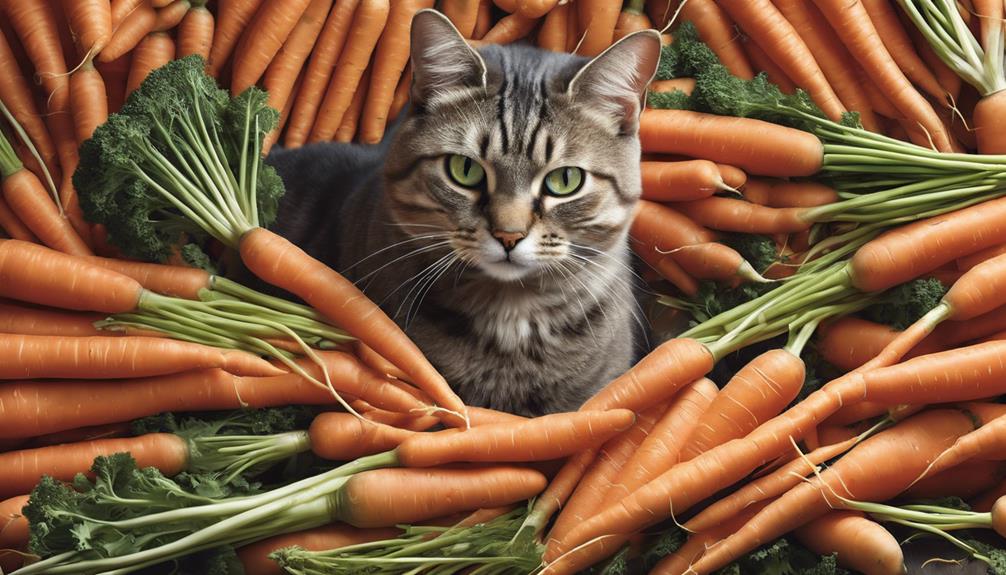
Excessive consumption of carrots by cats can lead to various health issues, given their inefficient conversion of beta-carotene to Vitamin A and the high natural sugar content in carrots. While carrots can be a vital snack for cats in moderation, overfeeding them can result in gastrointestinal problems. Cats lack the necessary enzymes to break down plant matter efficiently, making excessive carrot consumption taxing on their digestive system. The natural sugars in carrots can also be problematic for cats, potentially leading to issues like diarrhea or upset stomachs.
To guarantee your feline friend stays healthy, it's important to offer carrots in limited quantities. Moderation is key when it comes to incorporating carrots into your cat's diet. By providing small, occasional portions as a treat rather than a staple, you can avoid the risks associated with overindulgence. Remember, a balanced diet tailored to your cat's specific nutritional needs is essential for their overall well-being.
Frequently Asked Questions
How Much Carrots Can Cats Eat?
We should feed cats a limited amount of carrots, as too much can cause health issues. Carrots can aid digestion when given in moderation. It's important to prepare them plain to keep our feline friends healthy.
What Vegetables Can Cats Not Eat?
We should be cautious about feeding cats certain vegetables. Onions, garlic, grapes, raisins, avocado, raw potatoes, tomatoes, mushrooms, leeks, and chives are harmful. Researching safe foods for our feline friends is essential for their well-being.
Are Carrots Good for Cats Teeth?
Carrots are fantastic for our feline friends' dental health. They can help clean teeth by reducing plaque and tartar buildup, acting as a natural abrasive. Chewing them prompts saliva production, which decreases mouth bacteria.
Can Cats Be Allergic to Carrots?
Absolutely, cats can be allergic to carrots. While rare, symptoms like vomiting or diarrhea may occur. When introducing carrots to a cat's diet, do it gradually to observe any adverse reactions. Consult a vet for guidance.
Conclusion
To sum up, while cats can enjoy an occasional carrot as a treat, it's important to remember that moderation is key. Too many carrots can lead to digestive issues for our feline friends.
So, let's keep the carrots as a special snack rather than a daily staple in their diet. Remember, when it comes to carrots and cats, a little goes a long way!
